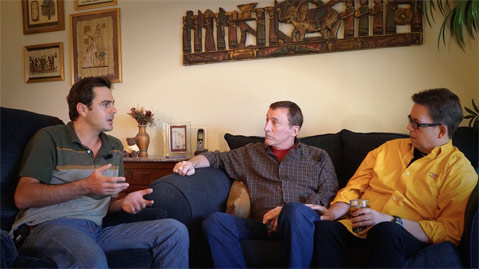Q&A with Jesse Aizenstat
Documentarian Discusses ‘My Gay Uncles’

In his new documentary My Gay Uncles, S.B. filmmaker Jesse Aizenstat examines past and present-day gay experiences through the stories of his uncle Andy, Andy’s new husband Donald, and of residents and bar-goers in San Francisco’s Castro neighborhood. Andy, an AIDS survivor who has seen same-sex relationships find much wider acceptance over the course of his lifetime, serves as the film’s starting point. I interviewed Aizenstat about what inspired him to make the film and what he learned from making it.
What inspired you to make the documentary? My inspiration for making this documentary came from my childhood. My uncle Andy (who the documentary is largely about) would often come and visit. He was a great guy and was full of fun and often eccentric behavior. As a child, I would ask my mom questions. Who is the man Andy brings with him? How can Andy have a family if his partner is another man? You know, questions that a child would ask out of ignorance and just simple affection for his uncle. My mom, a psychologist, would always answer in full, detailed answers. In the end, I had a pretty decent understanding of gay culture that my straight friends just didn’t have. So, I thought, why not make a documentary?
How was it interviewing your uncle and getting to know him on a deeper level? Growing up, was his struggle with AIDS something you were aware of? Video production is what I do professionally. I interview people all the time. Yet, no one to memory has been as open during an interview than my gay uncles, Andy and Donald. It’s really an amazing experience—and a gift for all of us to learn something about their lives. They are teachers to both gay and straight people, with anecdotes of wisdom that are both profoundly tear jerking and profoundly funny. They were made for TV.
I’ll never forget watching my mother cry on the kitchen floor when she got the news Andy was diagnosed with AIDS. But then the AIDS cocktail came out and he didn’t die. I was a kid and soaked up this experience like a sponge. I remember the drama like it was yesterday. But Andy and AIDS? Lets just say that my first lesson about needles and anal sex came from my mom (at age 10) when I naively asked her how someone could get AIDS. It was a shock, but a hardcore dose of reality. My uncle Andy was a teacher to me. This documentary I think shares some of those lessons.
I felt the transgendered woman you met, Kitten, was one of the more compelling characters in the documentary. How did it feel meeting her? Have you heard from her since? I actually had no intention of interviewing a transgender person. It just wasn’t part of the story. I was looking for gay homeless youths, trying to get to the bottom of the stat that forty percent of homeless street kids in America are gay (which is suspiciously high, given that roughly four percent of the population is gay). But gritty documentary making takes you where it will. And so we found Kitten. I’ll admit, her hygiene was a problem for me. But I wanted to make her believe that I wasn’t afraid or disgusted with her, like she said so many others are. I think she was just so lost being so different than everyone else. Finding social understanding had always been her biggest hurdle to get over. Kitten opened my mind to gender issues that I simply had never even considered.
It seems the documentary was cathartic in you for some ways, and a way of putting yourself out of your comfort zone. What was the experience of making it like? Sure, I learned great stuff about leaving my comfort zone in the filming of this documentary. I’m a big believer that some of the biggest payoffs in life come from leaving your comfort zone. But what really struck me the most was that gay people have had to put so much effort into overcoming their struggles, that if they can find peace and resolve, they can be some of the most warm, open and accepting people I know. My uncles and a few younger gay men we met in filming this documentary were like this. It was so different than hanging out with my straight friends. There is this feeling of peace with ones self that just isn’t found in your typical beer and football party.
Do you feel differently now about same-sex relationships or gay culture generally since having made the film? Do you feel differently about yourself? What changed? What I feel strongly about is that we in straight America actually have a lot we can learn from gay people. That is what is not said overtly in the culture. We can learn something from gay people overcoming adversity, making peace with ones self. We can learn something about what it’s like to just be different than the mainstream population. My uncles are some of the most open, understanding, non-judgmental dudes on Earth. It’s overcoming their hardships that have made them who they are. But honestly, they’re just great guys and I had to make a documentary sharing that.



